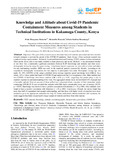Knowledge and Attitude about Covid-19 Pandemic Containment Measures among Students in Technical Institutions in Kakamega County, Kenya

View/
Date
2023-03-06Author
Mukoche, Erick Wanyama
Wanzala, Maximilla
Wamukoya, Edwin Kadima
Metadata
Show full item recordAbstract
Objectives: The goal of this research was to determine how well students understand and their attitudes
towards strategies to prevent the spread of the COVID-19 pandemic. Study Design: Cross-sectional research was
conducted using a questionnaire. Technical Vocational Education and Training (TVET) students in three institutions
filled out the survey after it was made available to them physically and online. Methods: It was determined whether
or not there was a statistically significant correlation between KAP (knowledge and attitude) and other sociodemographic factors by using chi-square testing. Using binary logistic regression, we were able to isolate and adjust
for any confounding variables. SPSS was used for the statistical analysis (version 26). Results: According to the
respondents' demographic information, the vast majority of participants were male. Participants' average age was
under 24. 42% (165/392) of the sample exhibited above-average expertise (good knowledge level [GKL]). As a
whole, 42% of those polled had heard of COVID-19 and understood that it is a respiratory virus. Male students had
less COVID-19 knowledge than female students (OR = 0.54, p = 0.01), suggesting that gender plays a role in
students' exposure to and understanding of the virus. The aggregated attitude items showed that 63.5% of people had
a favorable outlook. Sixty-six percent of those polled were concerned about a member of their immediate family
contracting COVID-19. It was revealed that students with GKL had a considerably lower rate of anxiety (28.2%,
p = 0.015). Knowledge was shown to have a positive association with attitudes (r =.48, p .001), while attitudes were
found to have a positive correlation with behaviors (r =.23, p .001). Conclusions: Overall, the survey found that
more than half of respondents had enough understanding, and that those with higher levels of expertise were more
inclined to go to the appropriate authorities for help. To further understand cultural similaritie
URI
http://article.scipublichealthresearch.com/pdf/ajphr-11-2-4.pdfhttp://ir-library.mmust.ac.ke:8080/xmlui/handle/123456789/2205
Collections
- Journal Articles [411]
